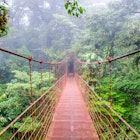
Jan 8, 2021 • 6 min read
Nov 18, 2020 • 2 min read

You'll be able to go chimpanzee trekking at Gishwati-Mukura National Park © Kjersti Joergensen/Shutterstock
{
"url": "giswati-makura-national-park-unesco-reserve",
"destination": "Rwanda",
"continent": "Africa",
"country": "Rwanda"
}The Gishwati-Mukura National Park in Rwanda has become a Unesco biosphere reserve and is opening to chimpanzee and primate trekking for the first time. The park consists of two natural forests Gishwati Forest and Mukura Forest – covering 35.58 sq kilometers in the districts of Rutsiro and Ngororero.
The forest was impacted heavily at the conclusion of the 1994 genocide, as large parts of the park were cleared as a result of human settlement, agricultural practices and illegal mining. The Rwanda Development Board and conservation partners have been working to reforest the area with endemic trees to allow the return of chimpanzees and smaller primates.
{
"url": "giswati-makura-national-park-unesco-reserve",
"destination": "Rwanda",
"continent": "Africa",
"country": "Rwanda"
}
The area is home to chimpanzees, mountain and golden monkeys, servals, genets, civets and small mammals. The designation of the park as a biosphere reserve will also conserve amphibians, reptiles, 250 species of plants and over 120 species of birds. Wilderness Safaris and Visit Rwanda are working to develop trekking in the park, which will start in tandem with the opening of a new camp called Forest of Hope Guest House and Camp Site, which they expect to unveil later this year.
While Gishwati has been protected as a national park since 2015, this will be its first overnight properties and visitor attractions. It is a true example of ecotourism, with the proceeds of every visit contributing to the reforestation, protection and conservation of both the park’s diverse flora and fauna and the upliftment of its surrounding communities.
{
"url": "giswati-makura-national-park-unesco-reserve",
"destination": "Rwanda",
"continent": "Africa",
"country": "Rwanda"
}
Guests visiting the Gishwati Research Station will also be invited to visit the onsite indigenous tree nursery and to plant a tree as part of the reforestation efforts. Further information can be found on Forest of Hope's website here.
Uganda’s incredible mountain gorillas are having a baby boom
World Lemur Day celebrates Madagascar's incredible and endangered animal
See wild beauty captured in these award-winning wildlife photos
{
"url": "giswati-makura-national-park-unesco-reserve",
"destination": "Rwanda",
"continent": "Africa",
"country": "Rwanda"
}

Jan 8, 2021 • 6 min read

Apr 7, 2020 • 5 min read





Mar 27, 2023 • 5 min read

Jan 12, 2023 • 9 min read
